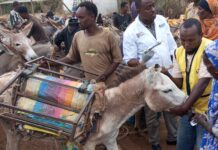By Lilian Museka
Nairobi, Kenya: In the run-up to the 2017 general election, Kenyan media displayed competition in trying to outshine each other to inform the electorate on the ongoing campaigns among the leading candidates. However, most of them could not unpack the issues and promises that various candidates were presented to the public concerning their past performances despite them creating a lot of tension.
Kenyans were treated to numerous debates of candidates trying to outdo each other but unfortunately, media could not put them to the task to explain their laid out strategies. This created anxiety among the eagerly awaiting electorate.
As much as reporters are required to report facts, they have a crucial role in breaking down information for their audience in times of conflicts. This is coupled with the need to explain the background information of the stories they are doing. History can look like a past event and far away from current news but the need to dig some background on facts ends up helping the reader understand the genesis of the news through the journalistic recollection of information
During a journalist, conflict-sensitive reporting training on Safeguarding the Democratic Space in Kenya (SADES) organized by Internews, the Executive Director, Kenya Human Rights Commission Mr. George Kegoro explained that there was a need for journalists to understand the nature and historical background of any conflict before writing about it.
“Every conflict has layers of complexity and there is a need for one to know what past events can be used to shape the understanding of modern events. It is about digging your journalistic teeth into the topic’s past to understand how and why things happen the way they do and how they impact people. History comes in handy then.”
Referring to the history of the Building Bridges Initiative (BBI) and how the two factions have attempted to divide Kenya into a leadership wrangle, Kegoro regretted that reporters were not linking the history of the initiative to their current stories.
Speaking on story mapping and contextualization, Kegore acknowledged that history also plays a role when one wants to establish a niche in reporting. For instance, the BBI has a history, and linking it to the articles gives the reader a better understanding. Also looking at the history of multiparty in Kenya makes the journalist understand the circumstances that forced the country to embrace it. This brings a clear picture of the genesis of violence we have witnessed in the past,’ he said
At the same time, Dr. Nyakundi Nyamboga, a lecturer and lawyer, while speaking on legal imperatives of conflict-sensitive reporting, retorted that providing a contextual understanding of a story makes the audience build trust in journalists.
This, however, added that there was a need for journalists to adhere to the code of ethics as the public trusts them to provide truthful information. “The fundamental objective of a journalist is to write an unbiased story on all matters of public interest. It is not an optional thing to adhere to what has been laid down in the code of conduct. The code is not imposed to journalists but their creation and therefore there are consequences if flouted.”
Nyakundi noted that even as journalists practice freedom and independence of the media, they must be alive to the fact that they have a limitation which includes the right of other people
Quoting the National Cohesion and Integration Act 2008 that encourages national cohesion and integration by outlawing discrimination on ethnic grounds, he urged the media to use their platforms in encouraging peaceful co-existence.
“ The new media platform has made the public more interactive thus created an alternative platform to discuss cross-cultural and integration issues that are often shunned by the mainstream media. Today, thousands of citizen journalism has evolved in line with the accessibility and growth of these technologies. Media should, therefore, be at the far front in discouraging hate speech. What you cannot do as a citizen, you cannot do as a journalist. You are first a citizen than a journalist,” he said
Media in Kenya is guided by other laws in Kenya which include the Media Council Act, 2013, and the Kenya Information and Communications (Amendment) Act, 2013.
Mr. Erick Mugendi, Managing Editor at PesaCheck, a fact-checking initiative, added that journalism is about finding facts, interpreting them, and sharing the information with the audience. “Fact-checking is central to the role of journalism in any society to avoid misinforming the public.
Mugendi noted that carelessly handled facts had the power to cause conflicts and therefore journalists need to check their biases by not limiting information to just one source.
“Professional journalists do not set out to reduce conflict. They seek to present accurate and impartial news. However, it is often through good reporting that conflict is reduced. If left unchecked, false or misleading information can lead to undermining institutions, undermining the credibility of individuals, derailing legitimate processes, and perpetuating stereotypes.
“In fact-checking, the media must seek to establish whether the information provided is truthful or potentially false or to avoid publishing falsehood. Ask yourself this first most basic question: Is the content I am looking at connected to an event that actually took place? In some circumstances, like a breaking news event, this question might be the very thing you are trying to ascertain with your verification.’ He adds.















